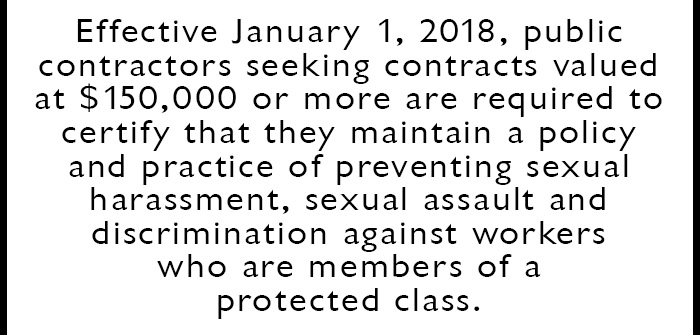Sexual harassment, sexual assault and discrimination are certainly in the forefront of many employer’s minds. The recent movement has shed new light on these problems across all industries and trades. In response, the Oregon legislature (which is dealing with its own sexual harassment issues), passed a law that requires public contractors to take additional steps to maintain and enforce policies intended to address and remediate these issues.
Effective January 1, 2018, public contractors seeking contracts valued at $150,000 or more are required to certify that they maintain a policy and practice of preventing sexual harassment, sexual assault and discrimination against workers who are members of a protected class. Protected classes specifically enumerated in House Bill 3060 include race, color, ethnicity, national origin, sex, gender (including actual or perceived gender identity), sexual orientation, disability, age, marital status, and religion.
Sexual harassment includes quid pro quo sexual harassment (where a term of employment is conditioned on accepting a sexual advance or request), and unwelcome conduct of a sexual nature that interferes with an employee’s performance or job duties or creates a hostile work environment. Sexual assault is unwanted sexual contact, as that term is defined in the criminal statutes. Discrimination is defined to include any conduct creating intimidating, hostile, or offensive employment conditions or employment conditions demonstrating animosity, anger, or resentment based on membership in or identification with a protected class.
Prospective contractors must certify in a signed writing that they
are in compliance, and all public contracts subject to the statute
must contain a material term requiring the contractor to certify compliance during the term of the contract. If the contractor fails
to make the appropriate certification, they will be ineligible for an
award of the public contract. If a contractor is awarded a contract,
and then subsequently fails to comply, the contractor would be in
breach of the public contract and may face a ban on an award of
future public contracts.
In addition to general prohibitions against harassment and discrimination, the policy and practice must include:
• a written notice to each employee that specifies disciplinary
measures for conduct violations (which can be provided in the
employee handbook);
• a clear reporting process, including what the contractor will do in
response to a report;
• a regular written procedure that identifies who a report should be
submitted to and who will be responsible for responding to, and
resolving, the issues raised in the report;
• a commitment to confidentiality for any report (to the extent
permitted by law);
• a provision prohibiting retaliation against any victims, reporters,
and witnesses; and
• a prohibition against discrimination in providing benefits, including
health insurance and health benefits, to an employee or their
dependent based on their membership in a protected class.
Contractors may provide written notice of their policy and practice by submitting a printed or electronic version of their employee handbook, so long as the handbook language satisfies all of the elements discussed above. The Oregon Department of Administrative Services is also charged with making an electronic template available on its website to guide contractors in meeting the notice requirements of the new law, as well as formulating other guidance to contractors and prospective contractors. Remember, the new law requires a specific provision to be included in all applicable contracts that addresses the certification obligation.
Public contractors should review their current policies and practices on prohibiting sexual harassment, assault, discrimination, and retaliation to confirm that they meet the law’s minimum policy and notice requirements before entering into any new public contracts over the $150,000 threshold. With the recent rise in claims relating to sexual harassment, assault, and discrimination, all employers should take this opportunity to review and update their policies, with the elements listed above providing a good base for any sound policy.
Tyler Volm focuses his practice on employment litigation and advice, as well as labor relations. He represents employers in a wide range of industries and has a unique perspective on how employers’ business needs naturally blend with employment law.





